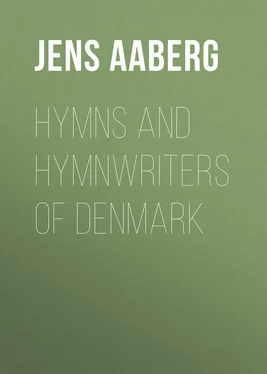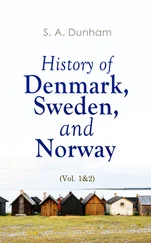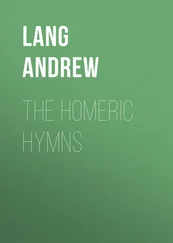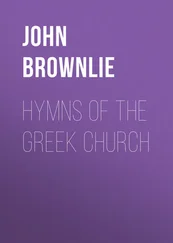Jens Aaberg - Hymns and Hymnwriters of Denmark
Здесь есть возможность читать онлайн «Jens Aaberg - Hymns and Hymnwriters of Denmark» — ознакомительный отрывок электронной книги совершенно бесплатно, а после прочтения отрывка купить полную версию. В некоторых случаях можно слушать аудио, скачать через торрент в формате fb2 и присутствует краткое содержание. Жанр: foreign_antique, foreign_prose, Историческая проза, на английском языке. Описание произведения, (предисловие) а так же отзывы посетителей доступны на портале библиотеки ЛибКат.
- Название:Hymns and Hymnwriters of Denmark
- Автор:
- Жанр:
- Год:неизвестен
- ISBN:нет данных
- Рейтинг книги:3 / 5. Голосов: 1
-
Избранное:Добавить в избранное
- Отзывы:
-
Ваша оценка:
- 60
- 1
- 2
- 3
- 4
- 5
Hymns and Hymnwriters of Denmark: краткое содержание, описание и аннотация
Предлагаем к чтению аннотацию, описание, краткое содержание или предисловие (зависит от того, что написал сам автор книги «Hymns and Hymnwriters of Denmark»). Если вы не нашли необходимую информацию о книге — напишите в комментариях, мы постараемся отыскать её.
Hymns and Hymnwriters of Denmark — читать онлайн ознакомительный отрывок
Ниже представлен текст книги, разбитый по страницам. Система сохранения места последней прочитанной страницы, позволяет с удобством читать онлайн бесплатно книгу «Hymns and Hymnwriters of Denmark», без необходимости каждый раз заново искать на чём Вы остановились. Поставьте закладку, и сможете в любой момент перейти на страницу, на которой закончили чтение.
Интервал:
Закладка:
As might be expected, the hymns are not all of the same merit. Some of them are exceedingly fine; others show the defects of an imperfectly developed language and a deficient literary taste. In the matter of style and form the author had almost nothing to guide him. It is not surprising, therefore, that his work shows crudities which no present day writer would commit, but that it should contain so much that is truly beautiful, even when measured by the standards of today.
Kingo had the true poet’s ability to see things poetically. To him the rays of the rising sun were not only shining but “laughing on the roof” of his home. His imagery is rich and skillfully applied. Many of his hymns abound in striking similes. Their outstanding characteristic, however, is a distinctive, forceful realism. Kingo, when he chose to do so, could touch the lyre with enhancing gentleness, but he preferred the strong note and searched always for the most graphic expression, sometimes too graphic, as when he speaks of the “frothing wrath of God” and “the oozy slime of sin”. Yet it is this trait of robust reality that invests his hymns with a large part of their enduring merit. “When Kingo sings of God, one feels as though He were right there with him”, one of his commentators exclaims. Nor is that realism a mere literary pose. Like most great hymns, his best hymns are reflections of his own experiences. Kingo never attained a state of saintly serenity. Whatever peace he found was gained only through a continuous struggle with his own fiery and passionate nature. Few hymns convey a more vivid impression of a believing, struggling soul than Kingo’s.
His morning hymns are among his best. He loved light and gloried in the birth of each new day. The sun is his favorite symbol. Its rising signifies to him the final triumph of life over death, and the new day is a token thereof. It sounds a joyful call to wake and resume life anew.
“Awake, my soul, the sun is risen,
Upon my roof its rays now laugh, – ”
Every Christian should rejoice in the newborn day and thank God for it:
Break now forth in Jesus’ name,
Blessed morn, in all thy splendor!
I will sweetest music render
And thy wondrous gifts proclaim.
All my spirit with rejoicing
Thanks the Lord for rest and care
And, His grace and goodness voicing,
Wings its way to Him in prayer.
But the commencing day also calls for consecration lest its hours be wasted and its opportunities lost:
Grant me, Lord, that on this day
Now with light and grace beginning,
I shall not submit to sinning
Nor Thy word and way betray.
Blessed Jesus, hover ever
Over me, my Sun and Shield,
That I firm may stand and never
Unto sin and Satan yield.
And the passing hours must admonish the Christian to work while it is day and to prepare for the evening that is coming:
Let each fleeting hour of grace
And the chiming bells remind me
That to earth I must not bind me
But Thy life and gifts embrace.
And when dawns my final morrow,
Let me go to Thee for aye,
Let my sin and care and sorrow
With my dust be put away.
Finest of all Kingo’s morning hymns is the splendid “The Sun Arises Now in Light and Glory”. This hymn presents all the finest traits of Kingo’s poetry, its vivid imagery, forceful style and robust faith. The following translation is by the Rev. P. C. Paulsen.
The sun arises now
In light and glory
And gilds the rugged brow
Of mountains hoary.
Rejoice, my soul, and lift
Thy voice in singing
To God from earth below,
Thy song with joy aglow
And praises ringing.
As countless as the sand
And beyond measure,
As wide as sea and land
So is the treasure
Of grace which God each day
Anew bestoweth
And which, like pouring rain,
Into my soul again
Each morning floweth.
Preserve my soul today
From sin and blindness;
Surround me on my way
With loving kindness.
Embue my heart, O Lord,
With joy from heaven;
I then shall ask no more
Than what Thou hast of yore
In wisdom given.
Thou knowest best my needs,
My sighs Thou heedest,
Thy hand Thy children leads,
Thine own Thou feedest.
What should I more desire,
With Thee deciding
The course that I must take,
Than follow in the wake
Where Thou art guiding.
Evening naturally inspires a different sentiment than morning. The rising sun calls for activity, the setting sun for reflection. As the sun sets, as work ceases and the busy day merges into the quiet night the soul begins to take account of its gains and losses, its assets and liabilities. The dying day also conveys a sense of insecurity, of approaching death and the need for pardon and protection. All these sentiments, so different from the hopes and prospects of the morning, are wonderfully portrayed in Kingo’s evening hymns, as for instance:
Vanish now all sinful dreaming,
Let the joy from heaven streaming
Occupy my soul and mind.
Watch, my spirit, and prepare thee,
Lest the cunning foe ensnare thee
When repose hath made thee blind.
Sleep now in God’s care appeasing.
While the noise of day is ceasing,
Lean upon thy Savior’s breast.
He will guard thee through the somber
Night and make thy final slumber
Quiet, peaceful, happy, blest.
In the last line with its crescendo of peace and happiness one almost sees the night merge into the final rest.
Among his evening hymns now available in English, the following, perhaps, is the best known.
Softly now the day is ending,
Night o’er hill and vale descending,
I will kneel before Thee, Lord.
Unto Thee my thanks I render
That Thou didst in mercy tender
Life and peace to me accord.
May Thy church Thy peace inherit,
Guide our leaders by Thy spirit,
Grant our country strength and peace.
To the straying, sad and dreary,
To each Christian faint or weary
Grant Thou solace and surcease.
Keep me, Jesus, while I slumber!
From my perils without number,
Shield me, Master, in Thy might,
That, released from sin and sorrow,
I may sing this song tomorrow:
Jesus was my Sun this night.
The publication of these hymns firmly established Kingo’s reputation as the foremost poet of his country. Expressions of appreciation poured in upon him from high and low. The king, to whom the hymns were dedicated, so greatly appreciated the gift that, only three years later, he called their otherwise obscure author to become bishop of Fyn, one of the largest and most important dioceses of the country.
Kingo was only forty-two years old when he assumed his new position. His quick elevation from an obscure parish to one of the highest offices within the church might well have strained the abilities of an older and more experienced man. But there can be no doubt that he filled his high position with signal ability. He was both able and earnest, both practical and spiritual. His diocese prospered under his care and his work as a bishop, aside from his renown as a poet, was outstanding enough to give him an enviable reputation in his own generation.
But since his permanent fame and importance rest upon his achievement as a hymnwriter, his appointment as bishop probably must be counted as a loss, both to himself and to the church. His new responsibilities and the multifarious duties of his high office naturally left him less time for other pursuits. He traveled, visited and preached almost continuously throughout his large charge, and it appears like a miracle that under these circumstances, he still found time to write hymns. But in 1684, only two years after his consecration as bishop, he published the second part of Spiritual Song-Choir.
Читать дальшеИнтервал:
Закладка:
Похожие книги на «Hymns and Hymnwriters of Denmark»
Представляем Вашему вниманию похожие книги на «Hymns and Hymnwriters of Denmark» списком для выбора. Мы отобрали схожую по названию и смыслу литературу в надежде предоставить читателям больше вариантов отыскать новые, интересные, ещё непрочитанные произведения.
Обсуждение, отзывы о книге «Hymns and Hymnwriters of Denmark» и просто собственные мнения читателей. Оставьте ваши комментарии, напишите, что Вы думаете о произведении, его смысле или главных героях. Укажите что конкретно понравилось, а что нет, и почему Вы так считаете.












